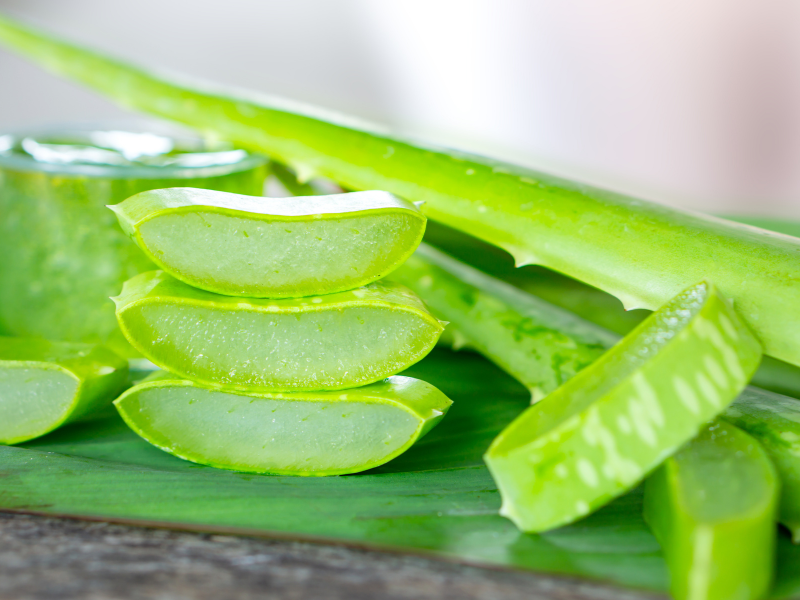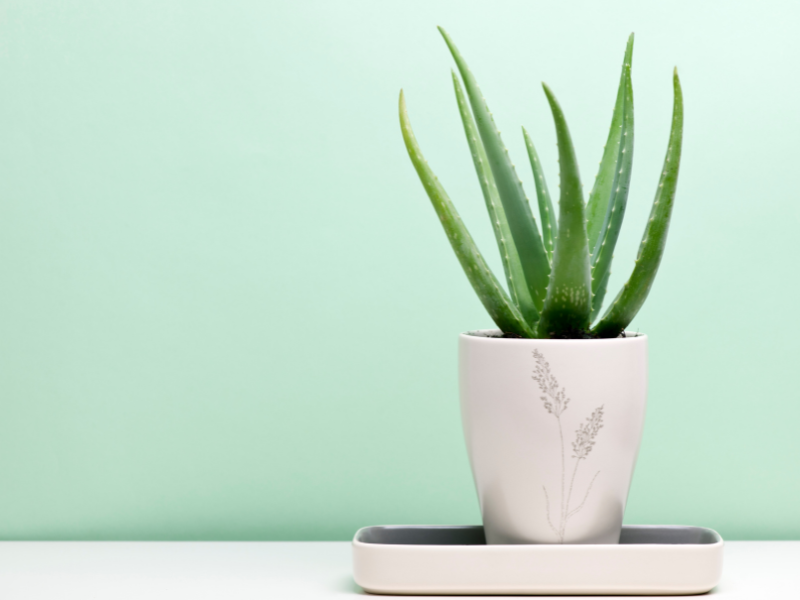Aloe vera (Aloe barbadensis) is an excellent herbal remedy that you can use for many types of skin problems. Use the leaf from an aloe vera plant and cut to extract the gel inside. Apply directly to the skin. You can also buy the gel pre-prepared.
Aloe vera gel comes from the middle of the leaf. The outer part of the leaf latex makes aloe resin. Aloe gel and aloe resin have very different uses.
Benefits of Aloe Vera as a Skin Remedy
Aloe vera gel is one of the best herbal remedies for skin care. It is soothing and moisturising and helps to cool inflammation and heal wounds. With antibacterial and antifungal properties, aloe vera can help reduce skin infection.
Use aloe vera gel directly on the skin for cuts, abrasions, and burns. It is an excellent remedy for sunburn. Apply aloe vera gel to sunburnt areas to cool and minimise skin damage. Use on friction burns, chafing, and shaving rashes.
If you suffer from acne, you can apply aloe vera gel directly to blemishes to fight bacteria and reduce redness.
For dry and inflammatory skin problems, such as dermatitis, the gel helps to reduce inflammation, redness, itching, and dryness. Aloe vera can help with eczema, psoriasis, and dermatitis caused by contact with detergents, irritants, and allergens.
Aloe vera’s antifungal properties may help with some fungal skin infections.

Digestive Benefits of Aloe Vera
Aloe vera juice is soothing for digestive problems. Herbalists use it for irritable bowel syndrome (IBS), heartburn, and stomach ulcers. You can buy aloe vera juice in most health food stores. Read more about herbs for heartburn here Heartburn Relief – Four of the Best Herbs to Ease Symptoms
The resin from the outer part of the leaves has a laxative effect which helps with constipation. However, it contains anthraquinones which can be irritating and damage bowel function if taken long-term. I would advise against using aloe resin as a laxative unless prescribed by a Medical Herbalist.
Premade aloe vera juice contains gel from the inner leaves mixed with water. It does not have a laxative effect because it contains little or no anthraquinones.
Cosmetic Uses
Manufacturers add aloe vera gel to shampoo, conditioners, moisturising lotions, and skin creams. It helps to nourish and condition the hair and moisturise skin. In dandruff and itching, the gel helps soothe and calm irritation.
Summary
Aloe vera is an excellent skin remedy. It has antibacterial, antifungal, and anti-inflammatory properties and can soothe irritated skin. Cooling and healing use aloe vera gel on wounds, burns, chafed, inflamed, and irritated skin.
The juice helps with gastrointestinal problems. Aloe resin is a laxative but must be used with care and only under professional supervision.
Cautions
- Some people have a topical allergy to aloe vera gel. If you have sensitive skin, it is a good idea to patch test a small area 24 hours before use.
- Premade gels purchased over the counter contain preservatives and are not for internal use.
- Never cut the leaf up and blend it to make juice. It will contain anthraquinones and may cause diarrhea and gastrointestinal upset.
- Avoid aloe gel and aloe resin during pregnancy and breastfeeding.
- Aloe resin and anthraquinone laxatives have many cautions and contraindications. Only take on the advice of a suitably qualified medical professional.
- Always seek professional medical advice before using herbal remedies if you are pregnant, breastfeeding, taking medications, or have a medical condition.
Disclaimer
This article is for information purposes only and does not substitute for professional medical advice or treatment.


Recent Comments